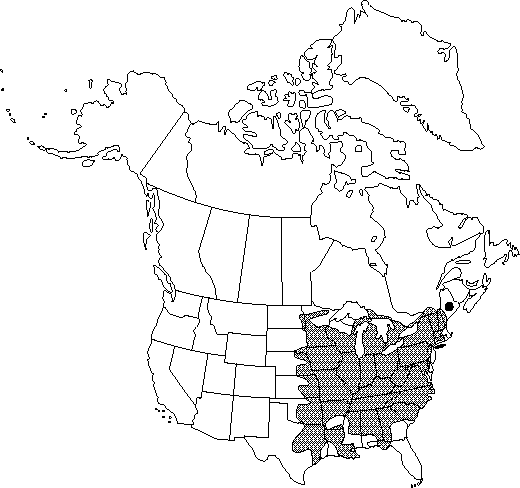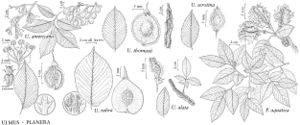Ulmus rubra
Trans. Amer. Philos. Soc. 5: 169. 1793.
Trees, 18-35 m; crowns open. Bark brown to red, deeply and irregularly furrowed. Wood soft. Branches spreading; twigs gray, densely pubescent when young, glabrous with age. Buds obtuse; scales red, margins red-tomentose. Leaves: petiole 5-7 mm, pubescent. Leaf-blade obovate to ovate, 8-16 × 5-7.5 cm, base oblique, margins doubly serrate in distal 1/2-3/4, singly serrate proximally, basal teeth 6 or fewer, rounded, less distinct, apex acuminate; surfaces abaxially tomentose, dense tufts of white hair in axils of major veins, adaxially harshly scabrous, trichomes pointed toward apex, margins ciliate. Inflorescences dense fascicles less than 2.5 cm, 8-20-flowered, flowers and fruits not pendulous, subsessile; pedicel 1-2 mm. Flowers: calyx green to reddish, shallowly lobed, lobes 5-9, reddish-pubescent; stamens 5-9; anthers reddish; stigmas exserted, pink reddish. Samaras yellow to cream, suborbiculate, 12-18 mm diam., broadly winged, samaras pubescent on body only, rusty-tomentose, margins glabrous. Seeds thickened, not inflated. 2n = 28.
Phenology: Flowering late winter–early spring.
Habitat: Lower slopes, alluvial flood plains, stream banks, riverbanks, and wooded bottom lands
Elevation: 0-600(-900) m
Distribution

Ont., Que., Ala., Ark., Conn., Del., D.C., Fla., Ga., Ill., Ind., Iowa, Kans., Ky., La., Maine, Md., Mass., Mich., Minn., Miss., Mo., Nebr., N.H., N.J., N.Y., N.C., N.Dak., Ohio, Okla., Pa., S.C., S.Dak., Tenn., Tex., Vt., Va., W.Va., Wis.
Discussion
Scabrous-leaved Ulmus rubra is often confused with U. americana. Where ranges coincide, U. rubra may freely intergrade with Ulmus pumila Linnaeus, a widely introduced species.
The red-rust, mucilaginous inner bark of Ulmus rubra is distinctive; its sticky slime gives this tree its common name of slippery elm. Native American tribes used Ulmus rubra for a wide variety of medicinal purposes, including inducing labor, soothing stomach and bowels, treating dysentary, coughs, colds, and catarrhs, dressing burns and sores, and as a laxative (D. E. Moerman 1986). Various preparations utilizing it are still marketed.
Selected References
None.
